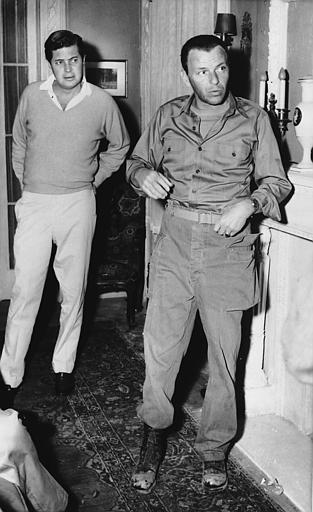
Screenwriter George Axelrod (THE MANCHURIAN CANDIDATE) Dead at age 81...
June 22nd, 2003

Frank Sinatra, right, and writer/producer George Axelrod, left, are seen on the set of "Manchurian Candidate," in this Feb. 22, 1962 file photo.
Screenwriter and playwright George Axelrod died in his sleep of heart failure, said his daughter, Nina Axelrod. He was 81. "He ended his life very peacefully in his home overlooking Los Angeles," she told the Associate Press. "He was very happy."
A legend in the writing community at large. As a playwright he anticipated the sexual revolution with his "The Seven Year Itch" and "Will Success Spoil Rock Hunter?" His screenwriting career was equally impressive with such films as "Breakfast at Tiffany's" and "The Manchurian Candidate" to his credit.
Born on June 9, 1922, in New York City, he started out as a radio and television writer. In 1952 he wrote "The Seven Year Itch." It was a raucous play about a man who after his wife and children go to the country, pursues the young beauty who lives above his apartment. The play lasted almost three years on Broadway and was filmed by 20th Century Fox as a vehicle for Marilyn Monroe, with Tom Ewell repeating his role in the play. The movie was a box-office hit, aided by the classic photo of Monroe's skirt being blown into the air.
Axelrod, who collaborated with Billy Wilder on the script, declared in 1955 "we didn't make a very good picture." The industry censor forbade the sexual innuendo contained in the play and would not allow the two characters to sleep together. Not all of his plays were adapted to the big screen with his approval however. "Will Success Spoil Rock Hunter?" a satire on Hollywood was also filmed by Fox, with Tony Randall and Jayne Mansfield as stars, but Axelrod refused to support it saying, "They didn't use my story, my play or my script. He wrote another script for Monroe, "Bus Stop," based on William Inge's play. His next assignment, "Breakfast at Tiffany's," was yet another bitter experience for the writer when he clased with director Blake Edwards. He soon became the highest paid writer in films.
Axelrod, who like many playwrights of his era refused to live in Hollywood, made no apologies for his reaction to his films. After several complaints, Wilder reportedly told him, "You can't sit in New York, see the finished project, then raise hell about it. If you want to be involved in the making of the picture, you've got to be out here to do it." Shortly thereafter Axelrod moved to Hollywood.
Perhaps the pinnacle of his screenwriting career came in 1962 with "The Manchurian Candidate." Adapted from Richard Condon's novel about wartime brainwashing and subversive politics. He declared in 1995 that the script "broke every rule. It's got dream sequences, flashbacks, narration out of nowhere ... Everything in the world you're told not to do." When it was released critics and audiences were offended by the depiction of an American POW in Korea who returns home and kills a powerful politician. Poor timing also hurt and it was soon shelved after President Kennedy's assassination. When the film was re-released in 1987, critics proclaimed it a classic.
In 1987, Axelrod was saluted at the New York Film Festival, during his speech he said "I always wanted to get into the major leagues, and I knew my secret: luck and timing. I had a small and narrow but very, very sharp talent, and inside it, I'm as good as it gets."
Indeed he was.
-- Chris
Only logged-in members can comment. You can log in or join today for free!
Advertisement






